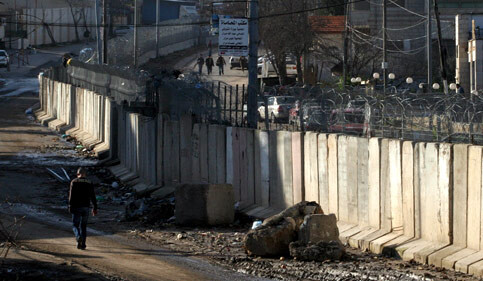The Electronic Intifada 24 April 2007

Israel’s wall in the West Bank village of Al-Ram, north of Jerusalem, 20 February 2007. (Moti Milrod/MaanImages)
Last Monday’s paper gave us a small reason to be happy. Israeli Prime Minister Ehud Olmert met with Palestinian Chairman Mahmoud Abbas for the second time in just a few weeks. Reporting the meeting — described by Palestinian sources as “fruitless” — Ha’aretz noted:
“An IDF lieutenant-colonel also attended the meeting. The officer briefed the Palestinians on the plan to remove IDF roadblocks in the West Bank. According to the officer, the IDF has so far removed 44 roadblocks. He added that the IDF was planning to remove an additional 17 in the next stage of the plan. The sources said that the Palestinian delegation requested the removal of more roadblocks, and that Olmert expressed his willingness.”
Good News, Isn’t It?!
Hear, hear: the IDF removed 44 roadblocks! This may not be much, given the rather extensive list of restrictions imposed on Palestinians, i.e.:
Standing prohibitions
Periodic prohibitions
Travel permits required
Checkpoints and barriers
Main roads closed to Palestinians, officially or in practice
So, given this list, as I was just saying, removing 44 roadblocks may not be much, but nevertheless, it is good news. Isn’t it?
Back in December 2006 …
Let’s refresh our memory. It all started last December, when Olmert met Abbas. Olmert promised to remove checkpoints in the West Bank: “I intend to personally supervise it,” he told Abbas, “so that the Palestinian society would feel the relief” (Ha’aretz, Dec. 24, 2006). The same day, Ha’aretz reported that Defense Minister Amir Peretz and his deputy Ephraim Sneh were actually working on a plan to facilitate Palestinian movement in the West Bank.
The two must have spent the whole night in their office, devising a plan for dismantling not less than “45 out of approximately 400 checkpoints.” At dawn, just as they intended to retire for a short nap, they found Ha’aretz at the doorstep, the top of which headline read: “IDF Opposes Olmert Plan to Dismantle West Bank Checkpoints.”
This sounded like a story worth following. In a democracy, the government sets the policy, the army carries it out. In other kinds of regimes, the army sets the policy, the government nods. Which regime is Israel’s?
Olmert Withdraws
A few days later (Ha’aretz, Dec. 27, 2006) the prime minister indeed ordered the army to dismantle scores of checkpoints — but “in a second phase, dependent on an additional decision of the political echelon.” So at the first stage, no checkpoints will be removed (and then we’ll see). This, as some Israeli sociologists claim, has always been Israel’s regime: instead of risking a dispute with the army, the government complies with the army’s demands.
Meanwhile, Aluf Benn of Ha’aretz revealed that the “new” plan to dismantle 45 checkpoints was nothing but an old document, prepared by the Israeli army originally in English — an “export product” for American eyes — back in 2005. And never implemented, of course. So much for the sleepless night of Olmert’s aides: all they did was feed the media with an old army document.
The Army Rewards
Anyway, the prime minister gave the army a green light not to dismantle any checkpoint. The army, for its part, did not leave this ministerial gesture unrewarded. On Jan. 17 Ha’aretz reported that the Israeli army finally complied.
“The Israel Defense Forces announced yesterday that it recently removed 44 dirt barriers that were located near Palestinian villages in the West Bank. In recent years, the army established nearly 400 barriers and permanent roadblocks. The move is one of a series of steps aimed at easing restrictions on the Palestinians that were announced following the December 24 meeting between Prime Minister Ehud Olmert and PA Chairman Mahmoud Abbas.”
So you see: Olmert did keep his solemn promise, and the Israeli army did carry it out and did dismantle 44 checkpoints. At least, that’s what the army announced, and the Israeli army always tells the truth. Well, almost always.
Oops …
In this exceptional case, it took less than a week to expose the dirty deal between the government and the army. Scores and dozens of such deals — among the government, the army, and the settlers — are never exposed; the entire Israeli colonial project is based on such deals, made behind the back of all democratic mechanisms. But this was an exception. On Jan. 22, following an embarrassing UN report, the army had to admit:
The Israel Defense Forces admitted yesterday that the 44 dirt obstacles it said had been removed from around West Bank villages did not actually exist.So the 44 “removed” checkpoints, or dirt obstacles, didn’t exist in the first place. The Israeli lie probably counted on Israel’s information superiority: after all, who could count all those checkpoints better than the Israeli army? Alas, the UN turned out as an unexpected party-pooper.Last Tuesday, the IDF announced that it had removed 44 dirt obstacles that blocked access roads to West Bank villages, to fulfill promises made by Prime Minister Ehud Olmert to Palestinian Authority Chairman Mahmoud Abbas during their meeting a month ago. Olmert had pledged measures to ease the lives of Palestinian civilians.
However, a military source admitted yesterday that these obstacles ‘had either been removed before the political level decided on the alleviations or had been bypassed by Palestinians earlier, and a decision had been made not to rebuild them.’
Yesterday’s Lie Is Today’s Truth
But why bother to tell the truth when a lie is just as good? Three months later, Israel is again counting on our short memory. In an official meeting between the Israeli prime minister and the Palestinian president, no less, the army airs once again the legend about the 44 “removed checkpoints.” The lie exposed in January is recycled as truth in April, and everybody is happy: Israel can claim it kept its promise, the Americans can claim progress in the “peace process,” even President Mahmoud Abbas can claim an achievement.
Who would bother to remind us that all this is nothing but a lie? The abused Palestinians haven’t felt any relief whatsoever, but have been cynically cheated once again. And all of us media consumers have been duped along with them.
Remember this next time the Palestinians show their inexplicable ingratitude.
Remember this next time you hear an official Israeli announcement.
Dr. Ran HaCohen was born in the Netherlands in 1964 and grew up in Israel. He has a B.A. in Computer Science, an M.A. in Comparative Literature, and his PhD is in Jewish Studies. He is a university teacher in Israel. He also works as a literary translator (from German, English and Dutch), and as a literary critic for the Israeli daily Yedioth Achronoth. Mr. HaCohen’s work has been published widely in Israel. “Letter from Israel” appears occasionally at Antiwar.com. This article, which first appeared on Antiwar.com, is republished with the author’s permission.





